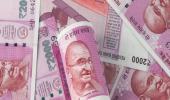China, Hong Kong Dominate India's Electronics Imports
China and Hong Kong account for over 50% of India's electronics, telecom and electrical imports, raising concerns about dependency and technological sovereignty.

Photograph: Jason Lee/Reuters
New Delhi, May 2 (PTI) India's imports of electronics, telecom, and electrical products soared to USD 89.8 billion in 2023-24 and over half of these imports are sourced from China and Hong Kong, economic think tank GTRI said in its report.
China dominates with a commanding 43.9 per cent share of India's imports in electronics, telecom, and electrical sectors, the Global Trade Research Initiative (GTRI) said.
The data highlights a deep-seated dependency on these two countries that has seen a dramatic escalation over the years, it added.
It said that reducing this dependency is crucial, not merely to boost economic resilience but to safeguard India's digital and technological sovereignty in a world that is becoming ever more interconnected.
"These sectors are integral to the daily lives of millions, enhancing communication, commerce, and information access. However, India's heavy dependence on imports, especially from China, presents formidable challenges to the nation's strategic autonomy and economic security," the report said.
GTRI Founder Ajay Srivastava said that this profound reliance on Chinese imports exposes severe vulnerabilities within India's supply chain and underscores the pressing necessity for strategic diversification of sources and enhancement of domestic production capabilities.
In the electronics segment, the report said that integrated circuits have experienced a significant import growth from USD 166.1 million during 2007-2010 to USD 4.2 billion in 2020-2022.
These circuits are critical for powering a wide range of electronic devices, from computers to smartphones, illustrating a deepening technological dependency on China, with their market share increasing from 19.2 per cent to 33.4 per cent.
Similarly, communication devices, including phones and other wireless devices, have also seen a significant increase in imports, rising to USD 3.691 billion with over half of the market now dominated by China.
"Diodes, transistors, and similar semiconductor devices have seen their imports skyrocket from USD 113.3 million to USD 2,334.8 million, with the Chinese market share jumping to 67.5 per cent, indicating a significant dependency on Chinese semiconductor technology," it said.
In the electrical sector, the report said that electric accumulators, including batteries for diverse applications, saw their imports surge from USD 254.2 million to USD 1.40 billion, with China securing a significant portion of this booming market for portable and renewable energy solutions.
Electric motors and generators have also witnessed an uptick in imports.
The report suggested that to reduce reliance on China and cut imports, a comprehensive strategic approach is essential.
This would involve both bolstering domestic manufacturing capabilities and diversifying import sources to mitigate risks and enhance technological sovereignty, it said.
"Firstly, India urgently needs to develop local semiconductor manufacturing. By establishing semiconductor fabrication plants for 30 plus nanometer chips backed by policy support and incentives, India can reduce reliance on Chinese semiconductors significantly," Srivastava said.
Similarly, with the imports of phones and other wireless communication devices reaching USD 3.69 billion, it is crucial for India to enhance its domestic manufacturing of these devices, he said, adding supporting local manufacturers through tax breaks, easier access to capital, and infrastructure development can help minimize dependency on Chinese components.
For critical components like diodes, transistors, and similar semiconductor devices, the report suggested investment in advanced technology to manufacture these components locally.
Collaborations with international technology firms for technology transfer and joint ventures could prove beneficial.
"In the electrical products sector, which includes items like electric accumulators and transformers experiencing substantial import growth, building a robust domestic industry is key. This can be achieved through heavy investment in research, capacity building, and supporting industries that can serve both local consumption and export markets," it added.
China dominates with a commanding 43.9 per cent share of India's imports in electronics, telecom, and electrical sectors, the Global Trade Research Initiative (GTRI) said.
The data highlights a deep-seated dependency on these two countries that has seen a dramatic escalation over the years, it added.
It said that reducing this dependency is crucial, not merely to boost economic resilience but to safeguard India's digital and technological sovereignty in a world that is becoming ever more interconnected.
"These sectors are integral to the daily lives of millions, enhancing communication, commerce, and information access. However, India's heavy dependence on imports, especially from China, presents formidable challenges to the nation's strategic autonomy and economic security," the report said.
GTRI Founder Ajay Srivastava said that this profound reliance on Chinese imports exposes severe vulnerabilities within India's supply chain and underscores the pressing necessity for strategic diversification of sources and enhancement of domestic production capabilities.
In the electronics segment, the report said that integrated circuits have experienced a significant import growth from USD 166.1 million during 2007-2010 to USD 4.2 billion in 2020-2022.
These circuits are critical for powering a wide range of electronic devices, from computers to smartphones, illustrating a deepening technological dependency on China, with their market share increasing from 19.2 per cent to 33.4 per cent.
Similarly, communication devices, including phones and other wireless devices, have also seen a significant increase in imports, rising to USD 3.691 billion with over half of the market now dominated by China.
"Diodes, transistors, and similar semiconductor devices have seen their imports skyrocket from USD 113.3 million to USD 2,334.8 million, with the Chinese market share jumping to 67.5 per cent, indicating a significant dependency on Chinese semiconductor technology," it said.
In the electrical sector, the report said that electric accumulators, including batteries for diverse applications, saw their imports surge from USD 254.2 million to USD 1.40 billion, with China securing a significant portion of this booming market for portable and renewable energy solutions.
Electric motors and generators have also witnessed an uptick in imports.
The report suggested that to reduce reliance on China and cut imports, a comprehensive strategic approach is essential.
This would involve both bolstering domestic manufacturing capabilities and diversifying import sources to mitigate risks and enhance technological sovereignty, it said.
"Firstly, India urgently needs to develop local semiconductor manufacturing. By establishing semiconductor fabrication plants for 30 plus nanometer chips backed by policy support and incentives, India can reduce reliance on Chinese semiconductors significantly," Srivastava said.
Similarly, with the imports of phones and other wireless communication devices reaching USD 3.69 billion, it is crucial for India to enhance its domestic manufacturing of these devices, he said, adding supporting local manufacturers through tax breaks, easier access to capital, and infrastructure development can help minimize dependency on Chinese components.
For critical components like diodes, transistors, and similar semiconductor devices, the report suggested investment in advanced technology to manufacture these components locally.
Collaborations with international technology firms for technology transfer and joint ventures could prove beneficial.
"In the electrical products sector, which includes items like electric accumulators and transformers experiencing substantial import growth, building a robust domestic industry is key. This can be achieved through heavy investment in research, capacity building, and supporting industries that can serve both local consumption and export markets," it added.
You May Like To Read
TODAY'S MOST TRADED COMPANIES
- Company Name
- Price
- Volume
- Vodafone-Idea
- 11.36 ( -2.49)
- 94664837
- AvanceTechnologies
- 1.16 (+ 4.50)
- 34522155
- Sunshine-Capital
- 0.26 ( -3.70)
- 29015901
- Alstone-Textiles
- 0.27 ( -3.57)
- 28695959
- Mehai-Technology
- 1.65 ( -4.62)
- 28262795






